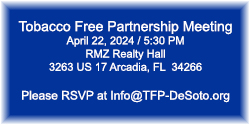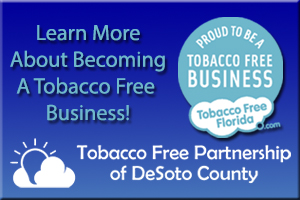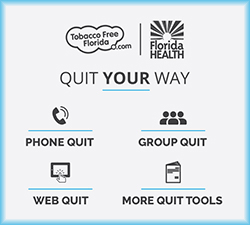changes in local tobacco policies
In 2007, The Centers for Disease Control and Prevention (CDC) published its Best Practices for Comprehensive Tobacco Control Programs. In Florida, the Department of Tobacco Free Florida has adopted these CDC guidelines as the model for tobacco control throughout the state.
The CDC Best Practices listed five key components for a successful Tobacco Control Program:
- State and Community Interventions
- Health Communication Interventions
- Cessation Interventions
- Surveillance and Evaluation
- Administration and Management
Our local efforts in DeSoto County are part of the State and Community Interventions as described by the CDC:
"State and community interventions include supporting and implementing programs and policies to influence societal organizations, systems, and networks that encourage and support individuals to make behavior choices consistent with tobacco-free norms. The social norm change model presumes that durable change occurs through shifts in the social environment, initially or ultimately, at the grassroots level across local communities. State and community interventions unite a range of integrated programmatic activities, including local and statewide policies and programs, chronic disease and tobacco-related disparity elimination initiatives, and interventions specifically aimed at influencing youth."
The mission of the Tobacco Free Partnership of DeSoto County reflects the goals of the CDC Best Practices, especially in regards to changes in local tobacco policies to create and promote tobacco-free social norms.
Target Policies
The following are some of the policy initiatives that the Partnership will be working on in DeSoto County:
- The education of the local community on the impact of point-of-sale advertising on youth tobacco initiation.
- The creation of new policies reducing youth exposure and access to smokeless tobacco products.
- The passage of resolutions by local governmental agencies supporting changes in the Florida Clean Indoor Air Act allowing for local creation of tobacco-free parks and beaches.
- Creation of voluntary tobacco-free policies at privately-owned outdoor environments to reduce the impact of secondhand smoke, especially around youth.
- The creation of voluntary changes in tobacco policies in multi-unit housing complexes.
- An increase in the number of tobacco-free workplaces, including an increase in the number of employers offering tobacco cessation programs to their employees.
Changes in tobacco policies should be patterned after model alcohol policies. There is a time and a place for the legal consumption of alcohol by adults, and many communities have policies restricting alcohol use in public places. Likewise, there should be a time and a place for the legal consumption of tobacco by adults; however, the more we learn about the effects of tobacco and secondhand smoke, the more obvious that it becomes we need policies restricting the use of tobacco in public places.
The Tobacco Free Partnership is working hard to make this happen, and, in doing so, improve the general health of the residents of DeSoto County. For more information, please contact Jodie DeLoach, our Community Health Advocate in DeSoto County, at JDeLoach@QuitDoc.com.







